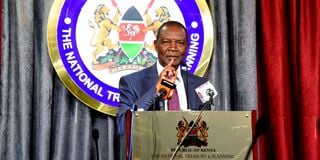Premium
Broke Treasury starts short-term debt swap

National Treasury and Economic Planning Cabinet Secretary Prof Njuguna Ndung'u during a press briefing at the ministry on November 10, 2022.
The National Treasury is seeking to swap Sh87.8 billion worth of short-term debt with longer-term debt to create breathing space and fund its operations in a tight fiscal environment.
Treasury Cabinet Secretary Njuguna Ndung’u had intimated during his vetting last month that a debt-swap plan would be adopted to give the government a longer window to repay its domestic debt.
The Central Bank of Kenya (CBK) has floated an infrastructure bond maturing in six years seeking to raise Sh87.8 billion from investors who are already holding Treasury bills issue numbers 2494/91, 2454/182, 2380/364 and Treasury bond issue number FXD1/2021/2. The debts mature in 91 days, six months, one year and over two years, respectively.
Investors who hold these instruments have until November 30 to apply for switching to the longer-term infrastructure bond.
“The bond will be tax-free as is the case for infrastructure bonds as provided for under the Income Tax Act,” said CBK in a prospectus for the switch auction. This implies that the government is using the tax-free sweetener to encourage investors to take up the switch.
In essence, the government is raising longer-term debt from the domestic market to help it retire short-term debt.
The proposed debt swap comes at a time the government is running on empty amid high debt repayment obligations, growing subsidy expenditure to ease the burden of the high cost of living and rising spending on development projects.
President William Ruto’s government spent Sh43.9 billion in the first quarter of the financial year 2022/23 on subsidies, mainly on fuel and fertiliser, nearly twice the Sh22.2 billion that was budgeted for subsidies for the entire fiscal year.
Data from Treasury shows the government is expected to service Sh461.4 billion in redemptions and Sh553.4 billion interest on domestic debt in the current financial year.
Infrastructure bond
The latest issuance comes shortly after an infrastructure bond through which the government has raised Sh94 billion against a targeted Sh65 billion, indicating a high appetite for debt from the domestic market.
Kenya’s stock of domestic debt currently stands at Sh4.37 trillion, of which Sh691 billion is held in Treasury bills and Sh3.6 trillion in bonds.
The country has Sh8.7 trillion of both domestic and external debt, equivalent to 62 per cent of the Gross Domestic Product.
The International Monetary Fund this month approved a further Sh52.7 billion loan to Kenya, pending approval by its executive board, as part of a 38-month package approved in April 2021. The country has so far received Sh188 billion in credit from the lender from the programme, which is expected to end in April 2024.
The biting cash crunch at the Treasury has seen President Ruto embark on a multi-pronged strategy to cut non-essential expenditures and subsidies and raise revenue collection to fund his key campaign promises.






